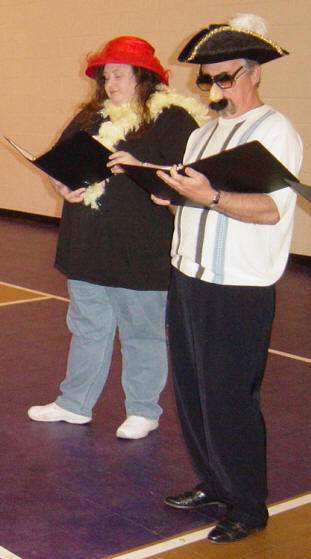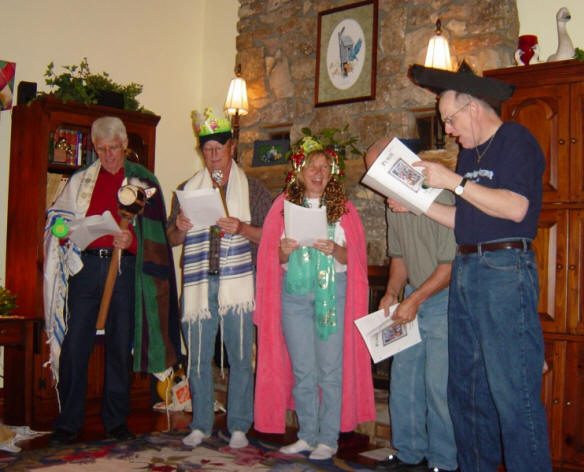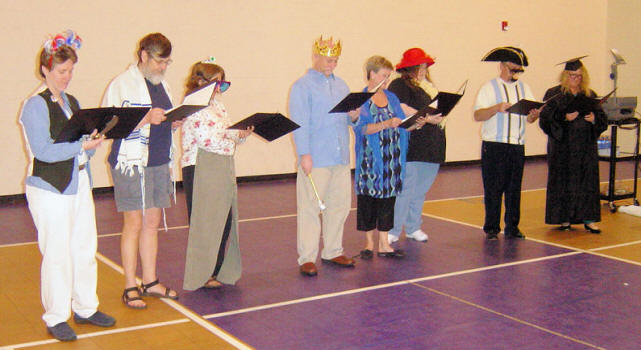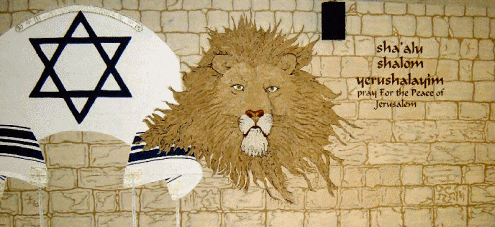Purim Play 1
PURIM
Celebrations
2013
2012
2011
2010
2009
2008
2007
2006
2005
2004
2003
Additional
Purim Plays
Esther O
Esther
A Traditional
Purim Story
PURIM
WARS
A Sci-Fi
Parody
The Wonderful
Kingdom of AZ
A Wizard of Oz
Parody
Esther-May &
the Shushan
Hillbillies
A Beverly
Hillbillies
Parody
Here on
Shushan Isle
A Gilligan's
Island
Parody
PURIM
Around the
WORLD
Purim in
Houston,
TEXAS
Please feel free to copy and use the play. I only ask that you let me know that you are and that you include the personal information at the top of the play. I'd love to see some photos from your performance - so please email me a few.
Purim: The Story of Esther
Story by
Curtis & Carolyn
828-241-2233
NARRATOR: It’s sometimes called the Feast of Lots … often called the Feast of Esther … but is usually called the Feast of Purim. Esther 9:28 These days should be remembered and observed in every generation by every family, and in every province, and in every city. And these days of Purim should never cease to be celebrated by the Jews, nor should the memory of them die out among their descendants.
Hear ye! Hear ye! Hear ye! This is the story of Esther – or if you prefer, how Purim started. Welcome one! Welcome all! Let me tell you a little about the characters in our story tonight.
This is Esther, a beautiful Jewish girl… with a destiny. You’ll learn more about her later.
Esther: Some folks call me Hadassah, but I prefer to be called Esther. You’ll notice me even before I get close. I’m “the Most!” I even smell like cinnamon toast. It comes from all of those months of special beauty treatments…six months with oil of myrrh, and six months with perfumes and cosmetics.
AHASHUERUS: Yeah! Yeah! So she smells sweet. But every story needs a hero…a real “He-Man”. …a real stud-ly guy! That’s me. Ahashuerus. I’m the King of Persia Media.
NARRATOR: This is King Ahashuerus! You should recognize him even from afar…rather distinguished looking…don’t you think? Notice the noble chin, deep set eyes, and BIG crown. …but not really of “royal” blood. (Whispering) He “bought” his position, so they say….he used to be a stable-keeper. Ahashuerus has chosen Shushan as his capital because of the Jewish craftsmen who live there. He wants a palace modeled after that of the Jewish King, Solomon.
This is Ahashuerus’ wife, Queen Vashti. She’s the one with royal blood, from the family of King Nebuchadnezzar…his granddaughter. Ahashuerus’ only real claim to the throne stems from Vashti, and they both know this very well. (Whispering) She continually reminds him of it, too. He married her thinking she would add validity to his kingship. She’s got a pretty BIG crown, too, and thinks it “ought” to be BIGGER than “his”, if you know what I mean!
VASHTI: I’m called Vashti. I’m the Queen of Persia Media. You think Women’s Lib is something new? Well, let me tell you, I had my ideas about that subject thousands of years ago.
NARRATOR: Some of you may recognize the Jew, Mordechai. He’s a Godly man and often sits by the gates of the city. He’s wise and well respected by all. He was exiled from Israel by King Nebuchadnezzar years ago.
MORDECHAI: Yes, I’m Jewish. I’m Mordechai, of the Tribe of Benjamin. We Jews have never asked for trouble, but HaShem, Blessed be His Name, seems to continually bless us with an ample supply. True? Of course, true!
NARRATOR: Every story has a villain. In this one, it’s this guy…Haman! (Pause for Boos & Hisses) It’s customary to show your distaste for him with a “Boo”, or a “Hiss” or by stomping your feet whenever his name is spoken.
He’s from the nation of Amalek. Maybe you remember when the Jews left Egypt and were crossing the wilderness…they had to fight against the people of Amalek. As long as Moses hands were raised, the Children of Israel prevailed, so Aaron and Hur held up Moses’ arms and they defeated the people of Amalek.
Later the Prophet Samuel told King Saul to smite Amalek and utterly destroy all the men, women, children, and cattle…everything. (1Samuel 15:3) Well… King Saul didn’t listen! But that’s another story.
This Haman was an Agagite, an Amalekite, of the descendants of Agag. Does that tell you anything? We’d be wise if we always listened to HaShem!! Haman has 10 schmuck sons, just as evil as himself!
Haman: Haman’s the name…self-promoting is my game. You’re not Jewish are you? …I just can’t stand those Jews! Step over Hussein…I was there long before you.
NARRATOR: Let’s move on…This is Haman’s wife, Zeresh. They say she’s much smarter than her husband…even able to speak several languages, but she’s a little stubborn and refuses to speak her husband’s native language. Hmmm! Sounds like these women need a good teaching on submission!
ZERESH: I’m Zeresh, “supportive” wife of Haman and mother of his 10 sons. Perhaps you know my three eldest sons, Saddam, Osamah, and Yasser? They’re just like their dad, real chips-off-the-old-block.
NARRATOR: We also have with us tonight one of the King’s Wisemen and an Attendant.
NARRATOR: This is what happened in the days of King Ahashuerus, who ruled over 127 provinces from India to Ethiopia. Ahashuerus gave a banquet for all his nobles and officials. The military leaders of Persia and Media, the princes, and the nobles of the provinces were present. The king also gave a 7-day banquet for all the people who lived in Shushan.
Vashti was Ahashuerus’ Queen, and she also gave a banquet for the women in the royal palace.
King Ahashuerus commanded the 7 eunuchs who served him …
AHASHUERUS: Bring Queen Vashti to the banquet wearing her royal crown, in order to display her beauty to the people and nobles. What’s the point of having a Queen of noble birth if you can’t show her off every now and then?
NARRATOR: So, the attendants delivered the king’s command, but it wasn’t received so well.
VASHTI: Who does he think he is? Just because he’s the King, and my husband, doesn’t give him any right to tell me what to do. Maybe I’ll go…and then…maybe I just won’t! We’ll see who wears the pants in this family!
NARRATOR: So, Queen Vashti refused to go.
AHASHUERUS: I’m so mad! I’m furious! What will the guys think? What should I do to Queen Vashti for not obeying my command?
WISEMAN: Queen Vashti has done wrong against the king and against everybody. All the women are going to hear about the queen’s conduct, and they might get ideas themselves. They will despise their husbands…and think they can just get by with it. There will be no end of disrespect and discord. Therefore, if it pleases the king, let him issue a royal decree and let it be written in the laws of Persia and Media, which cannot be repealed, that Vashti is never again to enter the presence of King Ahashuerus. Also let the king give her royal position to someone else who is better looking than she is. …someone who knows how to listen to her husband’s wishes!
AHASHUERUS: Yeah! I can go along with that! So be it!
NARRATOR: The king did as was proposed.
ATTENDANT: Let a search be made for beautiful young virgins for the king. Bring all these beautiful girls into the King’s harem at Shushan. The girl who pleases the king will be queen instead of Vashti. Remember, only beautiful girls…no homely ones, please!
NARRATOR: Now there was in Shushan a Jew of the tribe of Benjamin, named Mordechai. Mordechai had a cousin named Hadassah…and man was she “hot”. This girl, who was also known as Esther, was lovely in form and features, and Mordechai had taken her to raise as his own daughter when her father and mother died.
ATTENDANT: I understand that there is a beautiful young woman living in your home.
MORDECHAI: Yes, she is my cousin, Esther. Would you care to come in? …or shall we stand here in the streets solving all God’s riddles?
ATTENDANT: Just tell the girl to get her things. She’ll be going to the palace with me!
MORDECHAI: Esther, the king’s attendant is here, and he wants to take you to the palace. Seems the King is looking for a new wife.
Esther: But I’m not really interested in living in the palace … or being the new Queen. I enjoy my life here with you.
MORDECHAI: I’m sure you do, Esther … and I feel the same. But HaShem, Blessed be His Name, seems to have other plans for your life. True, dear cousin? Of course, true!
Narrator: After the king’s edict had been proclaimed, many girls were brought to Shushan, including Esther. Esther had not revealed her nationality and family background, because Mordechai had forbidden her to do so.
Before a girl’s turn came to go in to King Ahashuerus, she had to complete 12 months of beauty treatments, and then she would be invited to the King’s chambers. In the evening she would go there and in the morning return to another part of the King’s harem for the concubines. She would not return to the king unless he was pleased with her and summoned her by name.
The King was attracted to Esther more than to any of the other women, and so she won his favor. He set a royal crown on her head, making her queen instead of Vashti.
Mordechai would spend his days sitting at the king’s gate. One day while he was at the king’s gate, he overheard two of the king’s attendants who were conspiring to assassinate King Ahashuerus. When Mordechai found out about the plot, he told Queen Esther, who reported it to the king, giving credit to Mordechai. When the report was investigated and found to be true, the two officials were hanged on a gallows.
It was sometime after that when King Ahashuerus decided to honor Haman, elevating him and giving him a seat of honor higher than all the other nobles and princes. All the royal officials at the king’s gate knelt down and paid honor to Haman, as the king had commanded. But Mordechai would not kneel down or pay him honor.
When Haman saw that Mordechai would not kneel down or pay him honor, he was enraged.
HAMAN: Why aren’t you bowing to me? Don’t you know who I am?
Mordechai: Me bow to you? God should strike me dead first, Blessed be His Name, should I EVER bow to you! Yes, I know who you are, but I’m Mordechai, the Jew, and I bow before no one but God.
NARRATOR: Haman was furious! He looked for a way to destroy Mordechai and all of his people, the Jews.
HAMAN: King. There is a group of people scattered among the peoples in your kingdom whose customs are different from those of our people and who do not obey the king’s laws. These “Jews” are vermin – the very cause of every woe that has come upon us all! If it pleases the king, let a decree be issued to destroy them. They’re worthless people … and they have UGLY daughters!
AHASHUERUS: Sounds like a good plan, Haman. I’ll give you the signet ring from my finger. Do with these people as you please…especially the UGLY ones.
HAMAN: We will send out dispatches with the order to destroy, kill and annihilate all the Jews—young and old, women and little children—on a single day. I’ve just cast the “pur”, and the 13th day of the 12th month, the month of Adar, is the chosen day to kill the Jews and to plunder their goods.
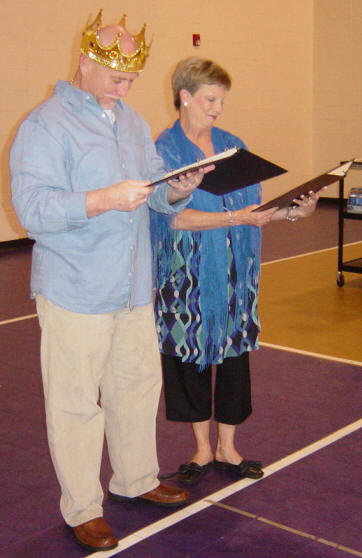
NARRATOR: When Mordechai learned of all that had been done, he tore his clothes, and put on sackcloth and ashes. Esther heard what Mordechai was doing, and she sent a eunuch to find out why.
MORDECHAI: Esther, that evil Haman, may his brains be turned to steam, has made plans to have all the Jews killed on the 13th day of Adar. You must go into the King’s presence to beg for mercy and plead for your people.
ESTHER: You know, any man or woman who approaches the king in the inner court without being summoned will be put to death. The only exception to this is for the king to extend the gold scepter to him and spare his life. Thirty days have passed since I was last called to go to the king. I might be “hot” but I don’t know if I want to risk it or not!
MORDECHAI: Do not think that because you are in the king’s house you will escape. If you remain silent at this time, relief and deliverance for the Jews will come from another place, but you and your father’s family will perish. And who knows but that you have come to royal position for such a time as this?
ESTHER: We need a miracle, and men can not work miracles without the hand of the Eternal. Gather together all the Jews who are in Shushan, and fast for me. When this is done, I will go to the king, even though it is against the law. And if I perish, I perish.
MORDECHAI: God’s greatest pleasure is making miracles from the dust of our despair; I will pray for a miracle.
NARRATOR: So Mordechai carried out all of Esther’s instructions.
On the third day, Esther put on her finest royal robes and stood in the inner court of the palace, in front of the king’s hall. When the king saw Queen Esther standing in the court, he was pleased with her and held out to her the gold scepter that was in his hand. So Esther approached and touched the tip of the scepter.
AHASHUERUS: What is it, Esther? What is your request? Even up to half of my kingdom, it will be given to you.
ESTHER: If it pleases the king, come today to a banquet I have prepared for you … and bring Haman, too.
NARRATOR: So the king and Haman went to the banquet Esther had prepared.
AHASHUERUS: OK, sweetie, we’re here. Now what do you want from me? I will give you anything. What is your request? Even up to half the kingdom. It will be yours.
ESTHER: If you really like me… if you regard me with favor and if it pleases you to grant my petition, come again tomorrow, along with Haman, to another banquet I will prepare for you. Then I will answer your question.
NARRATOR: Haman went out that day happy and in high spirits. He called together his friends, Zeresh - his wife, and his sons. Haman boasted to them about his vast wealth, his many sons--he had 10 of them--and all the ways the king had honored him & how he had elevated him above the other nobles and princes in Persia.
HAMAN: And that’s not all. I’m the only person Queen Esther invited to accompany the king to the banquet she gave, and she has invited me along with the king again tomorrow. All this gives me no satisfaction, however, as long as I see that Jew, Mordechai, sitting at the king’s gate and refusing to bow to me.
ZERESH: Then just get rid of him! Have a gallows built and in the morning ask the king to have Mordechai hanged on it. Then go with the king to the dinner and be happy.
NARRATOR: This suggestion delighted Haman, and he had the gallows built…right outside of his own house.
NARRATOR: Some people never learn!
NARRATOR:That night the king could not sleep; so he ordered the book of the chronicles of his reign to be read to him. Ahashuerus found recorded how Mordechai had exposed the two attendants who had conspired to assassinate him.
AHASHUERUS: I forgot all about that. What honor and recognition has Mordechai received for saving my life and bringing this matter to my attention?
ATTENDANT: Nothing has been done for him, sir.
NARRATOR: Shortly after that Haman entered the room.
AHASHUERUS: Haman, What should be done for the man the king delights to honor?
NARRATOR: Haman thought to himself …
HAMAN: Who is there that the king would rather honor than me?
Oh, King, if there is someone you desire to honor, then you should bring a royal robe the king has worn and a horse the king has ridden, one with a royal crest placed on its head. Then let your attendants robe the man that you desire to honor, and lead him on the horse through the city streets, proclaiming what this man has done and how the king delights to honor him.
AHASHUERUS: Great idea, Haman! Go at once, get the robe and the horse and do just as you have suggested … for Mordechai … the Jew.
NARRATOR: Haman was terrified and began to tremble. The king got up in a rage and went out into the palace garden. Haman, realizing that the king had already decided his fate, stayed behind to beg Queen Esther for his life. Just as the king returned from the palace garden to the banquet hall, Haman was falling on the couch where Esther was reclining, attempting to persuade her to change her mind concerning him.
AHASHUERUS: Will you even molest the queen while she is with me in my house? I know she’s “hot”, but she’s also MINE! What am I to do with you?
ATTENDANT: There is a gallows by Haman’s house. He had it made for Mordechai, who spoke up and saved the King’s life.
AHASHUERUS: Then, Hang him on it! …and good riddance!
NARRATOR: So they hanged Haman on the gallows he had prepared for Mordechai.
It had been a difficult time for the Jews living in Persia Media during the Babylonia captivity, but God never left them or forgot about them. They had always been, and will always be the Apple of His Eye.
Monarchs will come and go, empires will rise and fall, but Ha-Shem, Blessed be He, will always be in everlasting covenant with the seed of Israel.
NARRATOR: That same day King Ahashuerus gave Queen Esther the estate of Haman. He found out that Mordechai was Esther’s guardian, and had him brought into the palace.
Ahashuerus: Mordechai, the Jew, here is my signet ring. You shall be second in rank only to the King.
NARRATOR: The king took off his signet ring, which he had reclaimed from Haman, and presented it to Mordechai.
NARRATOR: Esther again pleaded with the king, falling at his feet and weeping. She begged him to put an end to the evil plan of Haman, which he had devised against the Jews.
AHASHUERUS: You know a law cannot be revoked once it has been written. But you may write another law in my name on behalf of the Jews and seal it with my signet ring.
NARRATOR: The king’s new law granted the Jews the right to assemble and protect themselves; to destroy, kill and annihilate any armed force of any nationality that might attack them and their women and children; and to plunder the property of their enemies.
Mordechai left the king’s presence wearing royal garments of blue and white, a large crown of gold and a purple robe of fine linen. The city of Shushan held a joyous celebration. For the Jews it was a time of happiness and joy, gladness and honor. Many people of other nationalities became Jews because of the favor they had found with King Ahasuerus. All the nobles of the provinces helped the Jews. Mordechai was prominent in the palace and his reputation spread throughout the provinces, and he became more and more powerful.
On the 13th day of Adar the Jews struck down their enemies with the sword, killing and destroying them. They killed 500 men in an attempt to protect their families and property, but they refused to plunder those who intended them harm.
AHASHUERUS: Now, Queen Esther, what is your petition? It will be given you. What is your request? It will also be granted.
ESTHER: If it pleases the king, give the Jews in Shushan permission to carry out this same edict again tomorrow, and let Haman’s ten sons be hanged on gallows.
NARRATOR: The king commanded that this be done. An edict was issued in Shushan, and they hanged the ten sons of Haman. The Jews in Shushan came together on the 14th day of the month of Adar, and they put to death in Shushan 300 men, but they did not take the plunder.
Meanwhile, the remainder of the Jews who were in the king’s provinces also assembled to protect themselves and get relief from their enemies. They killed 75,000 of them but did not take the plunder.
NARRATOR: Haman had plotted against the Jews to destroy them and had cast the “pur” (that is, the lot) for their destruction. But when the king found out, he issued written orders that the evil scheme Haman had devised against the Jews should come back onto his own head, and that he and his sons should be hanged on the gallows.
Therefore these days were called Purim, from the word “pur”.
NARRATOR: The Jews established the custom that they and their descendants and all who join them should observe these 2 days every year, in the way and time prescribed by Mordechai. The 14th and 15th of Adar should be remembered and observed in every generation by every family, and in every province and in every city. And these days of Purim should never cease to be celebrated by the Jews.
Mordechai the Jew was second in rank to King Ahashuerus, and was held in high esteem by his many fellow Jews, because he worked for the good of his people and spoke up for the welfare of all his people.
NARRATOR: Esther 9:28 These days should be remembered and observed in every generation by every family, and in every province, and in every city. And these days of Purim should never cease to be celebrated by the Jews, nor should the memory of them die out among their descendants.
Purim Play Notes
Our group is fairly small. Since the group is small, parts are not memorized beforehand, but instead are assigned on the evening of the play as the Narrator reads his/her part. Everyone is always willing to take a part and it's always interesting to see who will be portraying the character each year. Props and costumes are added to the characters by the Director during the play, which adds a lot of humor to the story.
Purim Play Props
Much of the humor in the play comes when the Director adds the props to the characters during the course of the play.
Esther: scarf, clip-on curls, perfume, crown, funny-looking pink robe,
King Ahashuerus: Burger King Crown, "Ring-Pop" ring, scepter (mine is made from a large pencil)
Queen Vashti: crown, sunglasses, men's pants ("You can tell who wears the pants in the family")
Mordechai: Kippah, Talit, Gold Crown (made from poster board & spray paint)
Haman: hat made from newspapers, glasses with big nose & mustache, Hobby-Horse (used to
lead Mordechai through the streets)
Zeresh: funny-looking ladies hat & scarf
Wiseman: graduation hat & gown
Attendant: baseball hat, toy water gun, toy handcuffs, hangman's noose for Haman
Dispatch Carrier: "Send Beautiful Girls", "Kill the Jews", "Defend Yourselves"
Cast Photos Over the Years
2003 Purim Cast Photo Mordechai (Doug), King Ahashuerus (Greg), Queen Esther (Linda), Haman (David) 2004 Purim Cast Photo Director (Curtis), Narrator (Kate), Sign Carrier (Jane), Miss Lincolnton (Christi),
Miss Shushan (Melba), Jasmine (Becky), Queen Vashti (Leslie), Mordechai (Doug),
Queen Esther (Kathy), King (Bruce), Miss Babylon (Lynda),
Miss Chaldea (Sheryl), Sam (Andy)
Not Pictured: Haman (Kirk)2005 Purim Cast Photo Wiseman (Bruce), Attendant (Becky), Narrator (Carolyn), Zeresh (Linda), Queen Vashti (Myrl), Haman (Greg), Mordechai (Andy), Esther (Linda), King Ahashuerus (Doug) 2006 Purim Cast Photo Esther (Connie), Mordechai (Bruce), Wiseman (Joe), Haman (Andy),
King Ahashuerus (Danny), Zerish (Sheryl)2007 Purim Cast Photo
Attendant (Kirk), Haman (Paul), Zerish (Susan), Esther (Kate),
King Ahashuerus (Joe), Mordechai (Andy), Wise-Woman (Leslie), Vashti (Myrl)2008 Purim Cast Photo
The King's Attendant (Stacy), Mordechai (Andy), Queen Vashti (Jane), King Ahashuerus (Chuck), Queen Esther (Janice), Zeresh - Haman's Wife (Allison), Haman (Bill), The King's Advisor/Wise Woman (Melba)
